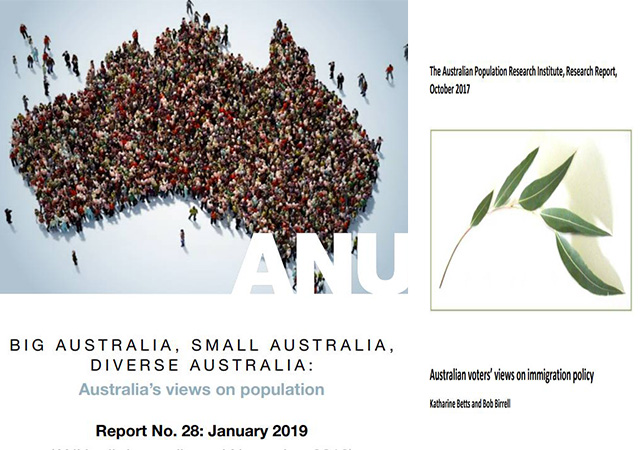 Surveys by the Australian National University and The Australian Population Research Institute (TAPRI) look at whether Australia is becoming increasingly insular.
Surveys by the Australian National University and The Australian Population Research Institute (TAPRI) look at whether Australia is becoming increasingly insular.
[This is an excerpt from an article appearing in The Round Table: The Commonwealth Journal of International Affairs.]
Although the notion of the imperilment of Australia as a nation by foreign others has been deployed regularly in Australia’s history, there is also a converse theme of openness and celebration of multiculturalism in Australia. Indeed, Australia is an oft-cited exemplar of multiculturalism, and Melbourne (the city of this article’s authors) has regularly won the title of ‘World’s Most Liveable City’, in part owing to the vibrancy of its multiculturalism. Characterising general or core Australian attitudes and sentiments is therefore difficult.
Attempts to take the pulse of Australia through surveys have not resolved matters. Recent reports by the Scanlon Foundation and The Australian Population Research Institute (TAPRI) had divergent findings. A reputable institution, The Lowy Institute, conducted a poll in 2017 that found that although a majority were ‘satisfied’ with current rates of immigration, support was nevertheless falling. A poll by the Australian National University, led by Nicholas Biddle, likewise shows a substantial decline in support by Australians for immigration over the last eight years, with 45.8% of respondents agreeing that ‘Australia needs more people’ in 2008, and 30.4% agreeing in 2018. Notably, however, amongst those not supporting immigration, there were diverse reasons for their opinion, including housing affordability and the impact on the environment. The cultural difference of immigrants is much less of an issue now; ‘Most people’, writes Biddle, ‘are now more support of, rather than worried by cultural diversity’.
By contrast, slightly older Scanlon Foundation data indicates general satisfaction with immigration levels. TAPRI data indicates significant and broad concern, with ethnocentric and religio-political overtones. The TAPRI report identifies attitudes towards the Islamic religion as a contributing factor to negative attitudes towards current immigration. This conclusion is supported by data on Australian attitudes towards religion and race from a University of Western Sydney study. In an online survey of mainly Australian-born respondents (72%), UWS researchers found evidence of significant resentment towards or mistrust of persons of the Islamic faith from the Middle East and South Asia. If we take the TAPRI report at face value, these attitudes are not confined to a single or small number of social groups, distinguishable by low incomes, precarious employment and low levels of educational attainment. People who identify as economically secure express opposition to immigration, and harbour suspicion of people from Middle Eastern countries.
There are therefore some grounds for concern over some strains of what might be referred to as insularity in Australia, which has probably been given further encouragement by high-profile leaders beyond Australia. Their strident nationalism normalises these sentiments, the predictable outcomes of which has been a government which was emboldened in recent years to cut Australia’s overseas aid budget significantly. Meanwhile others who have very different motivations, such as Hugh Mackay, are urging those in Australia to foster rich and meaningful communities by connecting with fellow residents of Australia who are near to them, while eschewing being seemingly ‘caught up in events beyond our reach’.
The authors of this article do not wish to argue against the importance of investing in our local communities and the individuals who are geographically near to us. However, we believe that delimiting our concern and compassion for others and their wellbeing or their suffering based on political geographical boundaries is wrong-headed. National boundaries are demonstrably arbitrary, and our ‘nearest and dearest’ can often live far afield. We believe that larger frames for neighbourliness – whether it be Asia, the Commonwealth, or the globe – also have merit and that defending our stake and investment in the wellbeing of others in these larger frames is not only humanitarian (in the wider sense of being concerned with human welfare, which is the sense of the word in use in this article) but also much needed in an age of increasing global interdependence, complexity, and risk.
This article outlines some findings from a research project carried out in conjunction with, and funded by, Australian Red Cross, on the back of concerns about the seeming increase in Australian insularity. The findings reported here are the result of sixteen interviews with practitioners in the humanitarian and development sector(s) in Melbourne. These interviewees were people who work for or had founded their own non-profit organisations that have as their objective the benefit of distant others beyond Australia. The motivations behind these interviews are the same as those that motivate studies into ‘positive outliers’ (which is also known as ‘positive deviance’, which perhaps carries unintended negative connotations). The positive outlier approach to addressing problems ‘capitalizes on a hugely energizing fact’; that fact is that ‘for any given problem, someone in the community will have already identified a solution. It focuses on people’s assets and knowledge, rather than their lacks and problems’. The premise is that much can be learned from these people and these learnings have the potential to inform wider practice. We do not at all suggest that our interviewees are exceptional in having compassion for others and acting on it. However, guided by our principle research question, ‘In what ways can the experiences of humanitarian practitioners in Australia shed light on effective engagement with Australians on humanitarian issues?’, we hoped to find, and indeed discovered, highly informative insights by interviewing them.
Julian C. H. Lee, Paul Battersby, Vandra Harris, Cecelia Hemana and Panayiota Romiosare are with the Social and Global Studies Centre, RMIT University, Melbourne, Australia.



